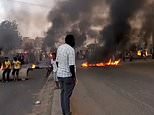Sudan’s leaders are rounded up and detained by the army in ‘military coup’
Sudan’s armed forces stage coup and place prime minister under house arrest after he refused to back it: Military detains civilian leaders, sparking protests in the streets
Abdalla Hamdok, Sudan’s prime minister, arrested by armed men early Monday Hamdok taken to ‘unknown location’ in what is widely thought to be army coupPrime minister had been leading country’s transition from decades of autocratic and military rule towards democracy following 2019 revolution Hamdok survived assassination in 2020 and another coup attempt last month
<!–
<!–
<!–<!–
<!–
(function (src, d, tag){
var s = d.createElement(tag), prev = d.getElementsByTagName(tag)[0];
s.src = src;
prev.parentNode.insertBefore(s, prev);
}(“https://www.dailymail.co.uk/static/gunther/1.17.0/async_bundle–.js”, document, “script”));
<!–
DM.loadCSS(“https://www.dailymail.co.uk/static/gunther/gunther-2159/video_bundle–.css”);
<!–
Sudan’s prime minister has been arrested and taken to an ‘unknown location’ in what civilian leaders have described as a military coup in the African nation.
Prime Minister Abdalla Hamdok was one of several ‘political and government’ leaders arrested by armed men who barged into homes early Monday, the country’s information ministry said.
Hamdok was ordered to support the coup by armed men and then arrested when he refused, the ministry added.
The 65-year-old former UN diplomat, who survived a failed coup just last month and an assassination attempt in 2020, was leading Sudan’s transition from decades of autocratic and military rule towards democracy following a revolution in 2019.
Trade unions which were central to that revolution denounced Hamdok’s arrest and urged people on to the streets for fresh protests.
Protesters burn tyres on the streets of Khartoum, the capital of Sudan, amidst a suspected military coup with civilian leaders rounded up and arrested
Trade unions that led the 2019 revolution which ended the military’s rule of Sudan urged people on to the streets for a campaign of ‘civil disobedience’ following the arrests
Crowds were subsequently pictured in the capital Khartoum burning tyres while demanding the release of the prisoners.
That revolution overthrew decades of rule by Omar al-Bashir, a former military general, and then a military council tasked with reforming the country.
Revolutionaries then handed power to a transitional council run by both military and civilian leaders tasked with rewriting the constitution and then holding elections, due for November 2022.
Tensions between civilian and military leaders have been evidence since the start of the transition, but have reached a head in recent months as deadlines for the handover of key powers from the army to civilians loomed.
Just last month, the government said it had thwarted a coup attempt by soldiers loyal to al-Bashir which had targeted Hamdok.
Hamdok subsequently gave a speech calling the coup attempt ‘the worst and most dangerous crisis that not only threatens the [democratic] transition, but threatens our whole country.’
His arrest comes just two days after a Sudan faction calling for a transfer of power to civilian rule warned of a ‘creeping coup’, during a press conference that an unidentified mob attack had sought to prevent.
Sudan has been undergoing a precarious transition marred by political divisions and power struggles since the April 2019 ouster of president Omar al-Bashir.
Since August 2019, the country has been led by a civilian-military administration tasked with overseeing the transition to full civilian rule.
But the main civilian bloc — the Forces for Freedom and Change (FFC) — which led the anti-Bashir protests in 2019, has splintered into two opposing factions.
‘The crisis at hand is engineered — and is in the shape of a creeping coup,’ mainstream FFC leader Yasser Arman told the Saturday press conference in Khartoum.
Abdalla Hamdok, Sudan’s prime minister, was overseeing the transition to democracy but has now been arrested and taken to an ‘unknown location’
The protests are centered around the Sudanese capital of Khartoum (pictured)
‘We renew our confidence in the government, Prime Minister Abdalla Hamdok, and reforming transitional institutions — but without dictations or imposition,’ Arman added.
Tensions between the two sides have long simmered, but divisions ratcheted up after a failed coup on September 21 this year.
Last week tens of thousands of Sudanese marched in several cities to back the full transfer of power to civilians, and to counter a rival days-long sit-in outside the presidential palace in the capital Khartoum demanding a return to ‘military rule’.
Hamdok has previously described the splits in the transitional government as the ‘worst and most dangerous crisis’ facing the transition.
On Saturday, Hamdok denied rumours he had agreed to a cabinet reshuffle, calling them ‘not accurate’.
The premier also ’emphasised that he does not monopolise the right to decide the fate of transitional institutions.’
Also on Saturday, US Special Envoy for the Horn of Africa Jeffrey Feltman met jointly with Hamdok, the chairman of Sudan’s ruling body General Abdel Fattah al-Burhan, and paramilitary commander Mohamed Hamdan Daglo.
‘Feltman emphasised US support for a civilian democratic transition in accordance with the expressed wishes of Sudan’s people,’ the US embassy in Khartoum said.
Analysts have said the recent mass protests showed strong support for a civilian-led democracy, but warned street demonstrations may have little impact on the powerful factions pushing a return to military rule.
![]()


